Mikuláš Dzurinda is greeted by Swedish Deputy PM Lena Hjelm Wallen at an EU summit in Gothenburg.photo: TASR
With both NATO and European Union heads last week setting concrete dates for their groups' expansion, Slovakia's chief integration officials said they had received "the clearest signals yet" that their western integration efforts would be rewarded in the next four years.
Speaking after a meeting of NATO heads in Brussels July 13, general secretary of the alliance Lord George Robertson for the first time confirmed that invitations would be extended to new members at a Prague summit next year.
Followed by statements from US President George W. Bush the same day that "in Prague [NATO] should be in a position to start the next wave of expansion," the unexpected confirmation of enlargement was warmly welcomed in Bratislava.
Then, just days later, at the EU summit in Gothenburg, European leaders set the end of 2002 as a target for wrapping up the pre-entry process for candidate countries "which are ready", and named 2004 as the official date of entry for those same states.
"Prepared countries should be able to complete negotiations by the end of 2002. The objective is that they should participate in the 2004 European Parliament elections as members [of the Union]," EU leaders said at the end of the summit.
The statement echoed one the EU made in Nice at the end of last year, when a treaty giving a blueprint for expansion was approved. This declaration differed, however, in that it gave concrete dates for expansion, and stated that "the process of enlargement is irreversible".
In the vanguard
At the head of a group of nations hoping to be invited to join the NATO defence alliance next year, and in a pack of nations trying to get into the EU two years later, Slovakia had previously had no official indication of when these hopes could be realised.
Officials in Bratislava now say that the statements made in Gothenburg last week have strengthened Slovak integration efforts.
"The final statement from the Gothenburg summit was a clear signal for us, and one which fills us with optimism," Mária Kadlečíková, Deputy PM for Integration, told The Slovak Spectator June 18. "Mr Robertson's words are equally positive."
Slovakia's chief negotiator for EU accession Ján Figeľ added: "Before, the EU had given us hope. This summit gives us commitment. It's a clear step forward from Nice."
Acknowledged along with Slovenia as the strongest candidate for NATO entry, and having caught up with - or passed altogether - neighbouring Hungary, Poland and the Czech Republic in EU accession preparations, Slovakia has worked hard to meet criteria for joining both organisations.
Having started EU negotiations in February last year, 18 months after its three neighbours, Slovakia has closed 17 out of the 29 pre-accession legislative 'chapters' it must complete before it can be admitted to the union. The Czech Republic has closed 19, Hungary 22 and Poland 16.
But concerns have arisen recently that despite the efforts of candidate countries, the EU itself may not be able to follow through on what it has promised. The statement from Gothenburg came just a week after a referendum in Ireland returned a shock rejection of the Nice treaty's ratification, which was seen as a rejection of the EU's eastward expansion.
The EU member states had been seen to be under pressure from candidate countries to set a firm date for expansion following the Irish vote, and many delegates in Gothenburg admitted that, ironically, the Irish referendum result may have quickened expansion.
Lord Robertson's statements may also put pressure on the EU to push ahead with the integration of former communist states. Following the fall of Communism in 1989, it was expected at the time that of the two organisations, the EU would be quicker than NATO to admit new states.
However, NATO took in Hungary, Poland and the Czech Republic in 1999, before the EU had even started negotiations with potential members.
"Certainly there has been some institutional competition between NATO and the EU on whether to and on how to admit former communist countries after the end of the cold war. If NATO enlargement does go ahead in Prague there will be more pressure on the EU to keep to its plans for expansion," said Vladimír Bilčík of the Slovak Foreign Policy Association.
"Slovakia can only have its EU entry chances improved if it gets into NATO," he added.
However, despite the sense of optimism in Bratislava, and while an invitation from NATO next year is widely expected, it is less clear that Slovakia, or any other members, will join the EU in 2004.
Opposition within the EU to setting a clear date was voiced by Germany before the summit. Spain and Italy have also expressed their concerns over the costs of admitting new members, demanding commitments from Brussels over funding for some of their poorest regions. The Irish referendum highlighted concerns in that state over enlargement.
Some of the most difficult legislative areas for Slovakia have also yet to be negotiated, including the free movement of labour, for which some EU member states have suggested there should be a seven-year transition period. The difficult work ahead could also slow Slovakia's progress in harmonising legislation prior to EU accession.


